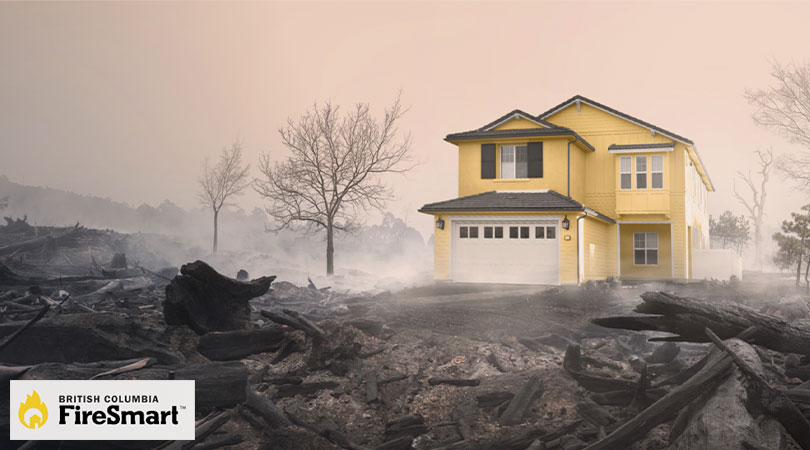The Homes That Are Prepared Are The Homes That Are Left Standing
The smell of smoke fills the air. The heat rises and the sky turns yellow with ash. The sounds of wood cracking and the pops and bangs of aerosols exploding can be heard from a distance. The heat sounds like a windstorm as fire tears across the ground.
It is terrifying.
But not uncommon.
Wildfires are natural part of British Columbia’s wildland ecosystems. Without wildfire, the landscape loses its diversity. By extending our communities into forested areas, we become more exposed to the danger of wildfire.
This summer the most important thing you can do is be prepared by using proven FireSmart methods to protect your home.
These simple steps are recommended by the Firefighters who have been on the frontlines and know first-hand what makes homes and communities more resilient to wildfires. To increase the probability that your home will survive a wildfire, it is highly recommend that you do the following:
- Clean your roof and gutters
- Mow your lawn regularly
- Move woodpiles and combustible material 10-30 meters away from your home
- Clean up dry leaves, twigs and branches from your yard
- Download and use the interactive FireSmart Begins at Home Manual
After years of devastating wildfires, firefighters and experts from around the world were asked one question: “What have we learned?” Watch their answers below.
These are simple tasks that could save your home by giving the fire less fuel. For even more protection, integrate FireSmart into your long-term renovations and upgrades. Here are some more tips to keep in mind when building or renovating your home:
- Choose a fire-resistant material for roofing
- Put a spark arrestor on your chimney
- Consider screening your vents
- Choose siding that offers superior fire resistance like stucco, metal, brick, concrete or fibre cement
- Install tempered, thermal (double-paned) windows
- Plant low-density, fire-resistant plants and shrubs and do not use bark or pine needle mulches within 10 meters of your home
These recommendations will help reduce the likelihood of you losing your home to wildfire. As the saying goes, an ounce of prevention is worth a pound of cure. How you prepare today could make the biggest different in what happens tomorrow. For a detailed look at all the things you can do to protect your biggest investment, please download the FireSmart Begins at Home Manual.
And remember: It’s the homes that are prepared, that are the homes that are left standing.
FireSmart BC website: www.firesmartbc.ca
FireSmart BC Twitter: www.twitter.com/BCFireSmart
FireSmart BC Facebook: www.facebook.com/firesmartbc
FireSmart BC Instagram: www.instagram.com/firesmartbc







